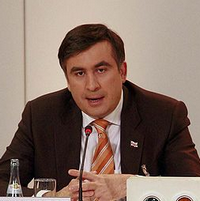TBILISI, Georgia -- Since coming to power in the 2003 Rose Revolution, the government of Georgian President Mikheil Saakashvili has declared in no uncertain terms its desire and intention to bring the country into the West's orbit. That goal has been most visibly illustrated by Georgia's efforts to join the NATO alliance as a full member. But geopolitical realities continue to interfere with those plans, forcing Tbilisi to adjust its foreign policy accordingly.
While pro forma support in Washington is widespread for Georgia's right to pursue NATO membership, most would give long odds on Tbilisi's chances of actually gaining acceptance in the 28-member club anytime soon. For its part, Georgia has not been blind to these realities. So perhaps it is fitting that, during the recent NATO summit in Lisbon, Tbilisi used a cabinet reshuffle -- as well as a highly publicized speech shortly thereafter -- to signal the contours of a foreign policy shift.
With evidence from Lisbon that the West's U.S.-led reset with Russia is bearing fruit, Georgia has invested new vigor into its bilateral relationship with the U.S. while also making difficult concessions to Moscow. Combined with Tbilisi's qualitative expansion in relations with Ankara, its burgeoning ties with Iran, and its engagement strategy toward the separatist regions of South Ossetia and Abkhazia, the contours of Georgian foreign policy are taking a decidedly realist shape.

